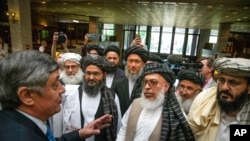Russia’s special envoy for Afghanistan visited Islamabad Friday to encourage Pakistan’s support for a meeting in Moscow to help facilitate the stalled Afghan peace process.
Zamir Kabulov told Russian news agency Sputnik earlier this week that he hopes the trip will encourage Pakistan’s support for the meeting to be held by the end of this month.
“My leadership has set the task of finding ways that will facilitate the start of inter-Afghan negotiations through consultations within the framework of the enlarged troika. We agreed on such a meeting with the American special envoy [Zalmay] Khalilzad. It can happen in Moscow,” he told the Russian government funded news outlet.
The “enlarged troika” is a reference to what Kabulov said is a group that evolved over the last two years, including countries with the most influence on the Afghan peace processes—the United States, China, Iran, Pakistan and Russia.
Russia hopes the meeting of the expanded troika could eventually lead to a larger gathering involving the Afghan government and Taliban along with other regional stakeholders like the Central Asian states and India. Diplomats who back the process say getting all of the regional powers involved in a peace agreement will give it a greater chance of success.
The Moscow format was a Russian initiative to organize regional stakeholders involved in the Afghan peace process. Its second meeting in 2018 brought the Taliban to an international forum for the first time. The U.S. sent representatives to observe.
The current push by Russia has gained momentum after peace talks between the Taliban and an Afghan government-sanctioned team, which started last September, stalled after several months of bickering and little progress.
Although Russia says it is trying to push for a meaningful interaction between the Afghan factions, parts of Kabulov’s interview to Sputnik, especially his suggestion of the need for an interim government set up that includes the Taliban, provoked a strong reaction from Kabul.
Afghanistan’s foreign ministry in a statement Friday said his remarks were against ground realities and counter to the official Russian stance on Afghanistan.
President Ashraf Ghani’s administration has consistently bristled at the idea of an interim government, claiming it has a constitutional mandate to govern for five years.
Meanwhile, the Russian Foreign Ministry has announced that Afghan Foreign Minister Hanif Atmar will visit Moscow later this month to meet his Russian counterpart Sergey Lavrov.
“The ministers plan to discuss various aspects of bilateral relations, including trade and economic ties, as well as peaceful settlement in Afghanistan, and the need to counter the threats of terrorism and drug trafficking,” Russian Foreign Ministry spokesperson Maria Zakharova, said at a briefing Thursday in Moscow.
The efforts to jumpstart negotiations between Taliban and Afghan government come at a time when the new administration of President Joe Biden is reviewing its Afghanistan policy.
Under a deal the U.S. signed with the Taliban in February of 2020, all foreign forces were supposed to withdraw from Afghanistan by May of 2021.
While attacks on foreign forces ceased after the deal, however, attacks on Afghan forces spiked, as did targeted killings of individuals, in particular rights activists and journalists.
At a NATO defense ministers meeting in Brussels that ended Thursday, the alliance refused to commit to a May 1 deadline for withdrawal.
“The problem is, to leave Afghanistan is conditions-based. Our presence in Afghanistan is conditions-based,” Secretary General Jens Stoltenberg told reporters. “[The] Taliban has to meet their commitments.”
Senior U.S. and NATO officials have blamed the change of heart on the Taliban not meeting its commitments, not breaking ties with al-Qaida, not negotiating with the Afghan government in good faith, and raising the level of violence in the country to an unacceptably high level.
“It just doesn’t create the conditions to move forward in what is hopefully a historic turning point for Afghanistan,” top U.S. commander in Afghanistan General Scott Miller told Reuters earlier this week.
The Taliban insists it has fulfilled its end of the bargain, a claim backed by Kabulov in his Sputnik interview.
“The Taliban adhere to the agreement almost flawlessly - not a single American soldier has died since the agreement was signed, which cannot be said about the Americans. They repeatedly hit the Taliban under various pretexts,” he said.
Americans say their agreement with the Taliban does not stop them from supporting Afghan forces under attack.
Russian Envoy Visits Pakistan as Part of Effort to Jumpstart Stalled Afghan Peace Process




